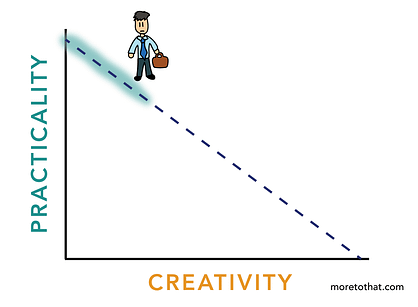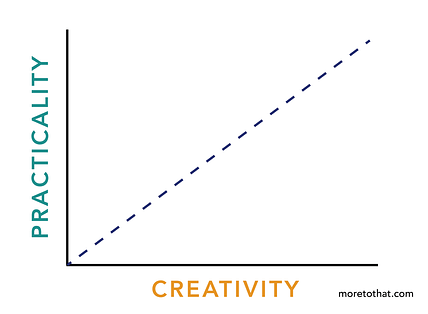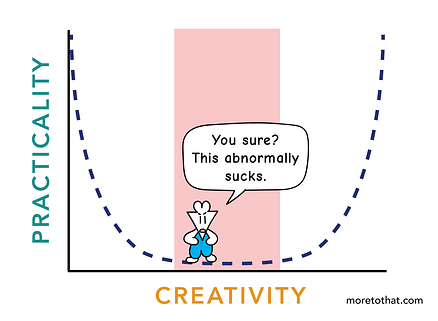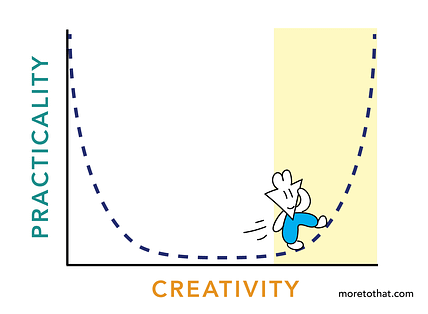Are you being a Practical Creator? In response to the viral essay by Laurence Yeo
A newsletter for the ambitious seeking clarity, confidence and focus in their work. By Ellen Donnelly, certified Coach and Founder of The Ask®. Are you being a Practical Creator? In response to the viral essay by Laurence YeoCoaching people in entrepreneurial careers gives me a perspective on the essay 'The Arc of The Practical Creator' to share with you today.In two years writing this newsletter, I have waxed lyrical on the powers of time and money (or lack of) in influencing your entrepreneurial abilities. So I was a little excited to see this very topic garner much attention when Laurence Yeo, creator of More To That published ‘The Arc of the Practical Creator in May’ and I have seen it quoted and shared on the interwebs ever since. At the time I was knee-deep running The Ask’s inaugural Talent to Money summit and only now am I getting around to writing the response I’ve been wanting to. A response not out of disagreement (this essay is seminal and deserves to stand the test of time) but because I have some things to say. I am a coach for entrepreneurial career paths. Therefore, knowing the differences between these types of paths is important to me, if perhaps even a mild obsession. This gives me a nuanced perspective and I feel his essay leaves out an important dimension. Specifically — the distinction between being a ‘creator’ and being a ‘founder’ or another type of business owner. Sometimes I think “It’s just semantics, get over it!” but then I really do believe it matters because it comes down to how you divert your attention and ultimately get paid — which I will refer to as ‘the business model of creatorship’. Yes, like entrepreneurship. I hope this post helps you to find more direction in your entrepreneurial path. Whichever label you choose.
|
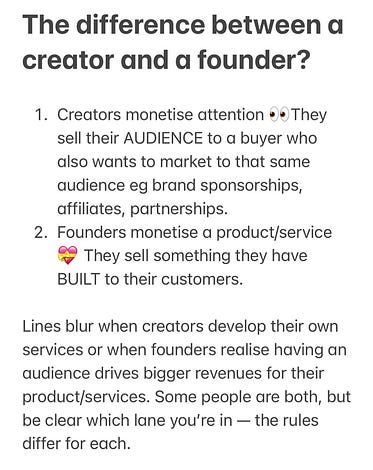 |
If the ‘creators’ in the stages of the arc that Laurence is referring to decided to make high-ticket services they would be able to quit their jobs earlier ahead of relying on a large audience because these could cover their bills.
On your creator journey if you plan your ‘business model of creatorship’ early on you can shortcut your path to profitability and ergo, practicality.
Being a more practical creator.
I work with a dozen or so new business owners whose income will likely be tied to the size of their online audience. But are they creators?
Here are some current client examples (names changed):
Alex is building a content platform/newsletter for people in codependent. This newsletter alone even if monetised is unlikely to cover the bills anytime soon. Instead, we are working on a plan for the other products and services to offer alongside the newsletter — and thus prime newsletter readers to buy offers are coming
Jane built a loyal following on Instagram into the tens of thousands. Did the reels thing etc. Then because the creator-audience relationship wasn’t set up to sell services when launching she failed to make sales. She’s now starting a new account from scratch
Amy began with a physical product she created and then built her online audience on TikTok — selling out her first batch because she was able to talk about the product all the time and it was not a surprise but instead aligned to the goals of the TikTok account
Sam has a newsletter and active social accounts and a full-time job she’d love to quit. Our work has been about designing the services she will offer her newsletter readers that will be able to meet her revenue goals — she will test these multiple times before quitting her job.
The only client I work with who is a pure creator by definition of selling their audience to other buyers, wants desperately to build something of their own, so that their income is less dependent on brand deals.
The point I am making here is that having clarity about what you are building is more important than just patience and feeling ‘ready’ because lots of people know about you.
You gotta prime your audience for what you are going to sell them.
It is all very well to work through the first two stages and be patient — but have a plan because likes and fans do not automatically equal revenue.
I’ve written this newsletter consistently for two years and spent over 1,000 hours on it but still doesn’t make me a penny. It costs me. But I have stuck with it because I am not a creator — I am an entrepreneur whose income comes from service including coaching and workshops. If I decided to monetise the newsletter (which is what Substack wants me to do) that would change the ‘business model of creatorship’' for me.
It is appealing. I would get more of that creative freedom Laurence describes… no longer would the newsletter only need to drive interest for my coaching services but could take on a life of its own and meet my practical needs.
But I would be trading something else; my attention. My attention would then go into writing perhaps at the expense of coaching. The only way to avoid this is to split my time and take on less coaching work to give the writing more focus. That would involved moving into Stage 2 and seeing a drop in income and certainty as a result.
What’s the right choice?
So are you a creator or a founder?
As you can see these lines are blurred so I totally understand why Laurence didn’t go to the painstaking efforts I have here to bother explaining (!) but my job is to help you figure out the direction you are heading in your entrepreneurial career.
Come spend an hour with me figuring it out and making a plan.
Define your business model of entrepreneurship v creatorship
Understand the rules of the game you are playing and how to measure progress
Generate new ideas for making money from your talents
Learn how to survive the silence and get strategies for navigating the dip when it feels like you’re shouting into the abyss
Feel confident you are on the right path that makes sense for your unique passions, goals, strengths and talents
Join me and a group of like-minded people pursuing entrepreneurial careers and figuring it all out, at Creator or Founder? A Masterclass on Thursday 15th September 1.30pm UK time.
You’ll leave with clarity, a plan and new ideas as well as an editable workbook to complete in your own time. Session recorded if you can’t join live. Get 25% off with the code August25 on tickets purchased before 15th August.
Final shout out to Laurence Yeo
Everyone — go read The Arc of the Practical Creator essay or pay patronage to his creative work by purchasing a $3 offline copy of the essay here.
More incredible resources from More to That (Laurence’s creative career) include his newsletter, a course on telling stories, and why the answer to life's greatest question isn't quite what we want to hear.
Thank you Laurence for your work and inspiring this post.
Thank you as always for reading!
Ellen Donnelly, Founder + Chief Coach, The Ask.
Book a complimentary consultation for coaching on your entrepreneurial career path here.
Sharing is caring! If you like this post from The Ask Newsletter give it some virtual love!
Older messages
How to find more clarity in your work
Wednesday, July 27, 2022
If you are feeling unclear in your professional path then know that you are not alone. My guidance for reclaiming a sense of alignment.
How to get back up again after you fall in entrepreneurship
Thursday, July 14, 2022
When you're taking risks, dreaming big and going for gold... you won't always reach the stars. Here's how to pick yourself up again after a fall.
How to make more money and beat your money worries
Wednesday, June 22, 2022
Let's be real... building an early-stage business brings all manner of money worries. Here are four approaches to help you quell those doubts and ultimately, make more of it.
What are the signs you are sabotaging your new business?
Wednesday, June 1, 2022
Part 2 of 2 on the common hurdles new founders face (a lack of time, money, confidence and focus).
What is stopping you from starting your new idea or business?
Wednesday, May 18, 2022
Part 1 of 2 as we explore the common hurdles new founders face in their lack of time, money, confidence and focus.
You Might Also Like
Only 3 spots!
Tuesday, March 18, 2025
Agency owners have been asking for this for a long time ͏ ͏ ͏ ͏ ͏ ͏ ͏ ͏ ͏ ͏ ͏ ͏ ͏ ͏ ͏ ͏ ͏ ͏ ͏ ͏ ͏ ͏ ͏ ͏ ͏ ͏ ͏ ͏ ͏ ͏ ͏ ͏ ͏ ͏ ͏ ͏ ͏ ͏ ͏ ͏ ͏ ͏ ͏ ͏ ͏ ͏ ͏ ͏
$164,449 In 15 Days (His side-income SECRET)
Tuesday, March 18, 2025
5-step action-plan to build a brand-new "side-income" View in browser ClickBank Hi there, This Friday (21st March) a top ClickBank client is running an online Strategy Lab where he'll
Canadian Ecom Seller? A New Course Just for You
Tuesday, March 18, 2025
How independent agencies are staying ahead of the curve
Tuesday, March 18, 2025
Elevating growth amid surging demand for digital media
It's time to bet on emerging platforms
Tuesday, March 18, 2025
Tips to keep your brand adaptable and embrace change ͏ ͏ ͏ ͏ ͏ ͏ ͏ ͏ ͏ ͏ ͏ ͏ ͏ ͏ ͏ ͏ ͏ ͏ ͏ ͏ ͏ ͏ ͏ ͏ ͏ ͏ ͏ ͏ ͏ ͏ ͏ ͏ ͏ ͏ ͏ ͏ ͏ ͏ ͏ ͏ ͏ ͏ ͏ ͏ ͏ ͏ ͏ ͏ ͏ ͏ ͏ ͏ ͏ ͏ ͏ ͏ ͏ ͏ ͏ ͏ ͏ ͏ ͏ ͏ ͏ ͏ ͏ ͏ ͏ ͏ ͏ ͏ ͏ ͏
Elon vs. Sora
Tuesday, March 18, 2025
Google's Veo 2 is in the race too!
The secret to CTAs that convert
Tuesday, March 18, 2025
Your call-to-action (CTA) is the final push that turns visitors into customers. But if it's weak, unclear, or generic, you're leaving money on the table. The best CTAs don't just say “Buy
ET: March 18th 2025
Tuesday, March 18, 2025
Exploding Topics Logo Presented by: Exploding Topics Pro Logo Here's this week's list of rapidly trending topics, insights and analysis. Topic #1 A Pup Above (trends) Chart A Pup Above is a
Newsletters are Dying... But Yours Doesn’t Have To.
Tuesday, March 18, 2025
The 5-Minute Hack to Save Your Dying Newsletter.
31% of All VC Money Last Year Went Into Just 20 Deals
Tuesday, March 18, 2025
Lots of venture capital is going to the same names To view this email as a web page, click here saastr daily newsletter Redpoint: 31% of All VC Money Last Year Went Into Just 20 Deals By Jason Lemkin


